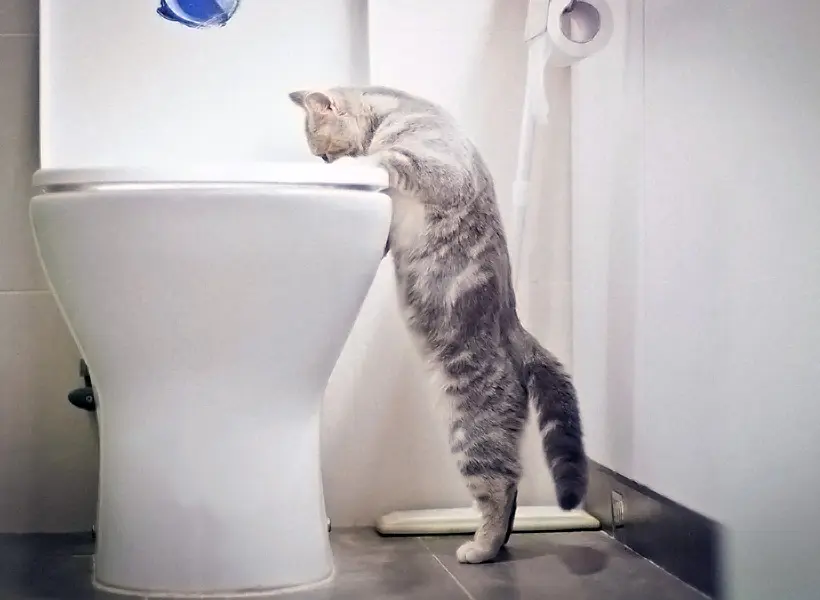We have discovered this great article about Don’t flush cat feces down the toilet listed below on the net and decided it made perfect sense to write about it with you on my blog.

Intro
As feline proprietors, it's vital to bear in mind exactly how we dispose of our feline buddies' waste. While it may appear hassle-free to purge cat poop down the toilet, this technique can have destructive effects for both the setting and human wellness.
Alternatives to Flushing
Thankfully, there are more secure and more responsible ways to throw away cat poop. Take into consideration the complying with choices:
1. Scoop and Dispose in Trash
One of the most typical technique of dealing with feline poop is to scoop it into a biodegradable bag and toss it in the trash. Be sure to make use of a committed clutter scoop and dispose of the waste immediately.
2. Usage Biodegradable Litter
Go with biodegradable cat litter made from materials such as corn or wheat. These trashes are environmentally friendly and can be safely thrown away in the garbage.
3. Bury in the Yard
If you have a yard, consider burying pet cat waste in a marked area away from veggie yards and water sources. Be sure to dig deep adequate to avoid contamination of groundwater.
4. Install a Pet Waste Disposal System
Buy a family pet waste disposal system especially created for cat waste. These systems make use of enzymes to break down the waste, minimizing odor and ecological influence.
Health and wellness Risks
Along with environmental worries, purging feline waste can additionally pose health and wellness threats to humans. Cat feces may have Toxoplasma gondii, a bloodsucker that can cause toxoplasmosis-- a potentially serious health problem, specifically for pregnant ladies and people with weakened body immune systems.
Environmental Impact
Flushing feline poop presents hazardous microorganisms and parasites into the water, posing a substantial danger to marine communities. These impurities can negatively affect aquatic life and concession water quality.
Conclusion
Responsible family pet ownership expands beyond offering food and shelter-- it also entails appropriate waste monitoring. By avoiding purging feline poop down the bathroom and choosing alternative disposal methods, we can reduce our ecological footprint and safeguard human health.
Why Can’t I Flush Cat Poop?
It Spreads a Parasite
Cats are frequently infected with a parasite called toxoplasma gondii. The parasite causes an infection called toxoplasmosis. It is usually harmless to cats. The parasite only uses cat poop as a host for its eggs. Otherwise, the cat’s immune system usually keeps the infection at low enough levels to maintain its own health. But it does not stop the develop of eggs. These eggs are tiny and surprisingly tough. They may survive for a year before they begin to grow. But that’s the problem.
Our wastewater system is not designed to deal with toxoplasmosis eggs. Instead, most eggs will flush from your toilet into sewers and wastewater management plants. After the sewage is treated for many other harmful things in it, it is typically released into local rivers, lakes, or oceans. Here, the toxoplasmosis eggs can find new hosts, including starfish, crabs, otters, and many other wildlife. For many, this is a significant risk to their health. Toxoplasmosis can also end up infecting water sources that are important for agriculture, which means our deer, pigs, and sheep can get infected too.
Is There Risk to Humans?
There can be a risk to human life from flushing cat poop down the toilet. If you do so, the parasites from your cat’s poop can end up in shellfish, game animals, or livestock. If this meat is then served raw or undercooked, the people who eat it can get sick.
In fact, according to the CDC, 40 million people in the United States are infected with toxoplasma gondii. They get it from exposure to infected seafood, or from some kind of cat poop contamination, like drinking from a stream that is contaminated or touching anything that has come into contact with cat poop. That includes just cleaning a cat litter box.
Most people who get infected with these parasites will not develop any symptoms. However, for pregnant women or for those with compromised immune systems, the parasite can cause severe health problems.
How to Handle Cat Poop
The best way to handle cat poop is actually to clean the box more often. The eggs that the parasite sheds will not become active until one to five days after the cat poops. That means that if you clean daily, you’re much less likely to come into direct contact with infectious eggs.
That said, always dispose of cat poop in the garbage and not down the toilet. Wash your hands before and after you clean the litter box, and bring the bag of poop right outside to your garbage bins.
https://trenchlesssolutionsusa.com/why-cant-i-flush-cat-poop/

We are very drawn to Can You Flush Cat Poo or Litter Down the Toilet? and I really hope you appreciated the blog posting. Sharing is good. You never know, you may be doing someone a favor. Thanks a lot for your time. Come back soon.
Need Help? Hire Us Now!